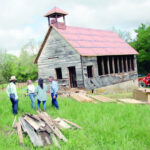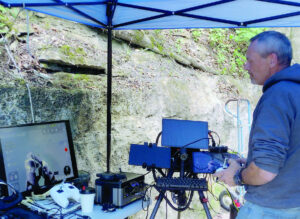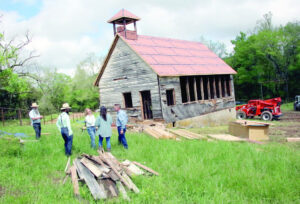Cupps: Application, odor control more pressing than possible soil, groundwater contamination
By Sheila Harris sheilaharrisads@gmail.com
State Rep. Scott Cupps, R-Shell Knob, said the poultry- processing wastewater residuals being land-applied in southwest Missouri by Denali and Synagro can be a beneficial soil amendment.
A farmer with a background in agricultural science and education, Cupps said he does not use the residuals on his own farm, but is willing to speak for the benefits of the practice in general.
“Returning organic waste back to the environment is beneficial if it’s done responsibly,” said Cupps, a Barry County native.
Cupps said he’s frustrated by the number of people who are spreading what he calls false information about the possible presence of toxic chemicals in the poultry-processing residuals, based on news articles from other states and countries.
“There were a number of tests conducted on poultry processing residuals when Denali bought out Terra Renewal in 2014,” Cupps said. “Those tests showed that some loads contained the cleaning agent sodium hydroxide, but sodium hydroxide is an incredibly basic compound and can even be considered a soil amendment like lime.”
Cupps said that with the application of residuals to Ozark soil, he’s not concerned by an over-abundance of nutrients entering groundwater, as many people fear.
He said Ozark soil is toxic by nature.
“They’re laden with metals like iron, lead, magnesium, selenium, aluminum and zinc,” Cupps said. “The Ozark Plateau is unique in that it’s the only true eroded plateau in the nation, the only truly productive eroded plateau.”
The Ozark Plateau — encompassing most of southern Missouri, a significant portion of Arkansas and parts of Oklahoma and Kansas — is comprised of highlands eroded by rivers, which have cut steep valleys into sandstone, dolomite and limestone over a period of millions of years.
“In many parts of the country, the river valleys are where you find the fertile soil that grows the best crops,” Cupps said. “But, for the most part, it’s the opposite in the Ozarks. The most productive land here is found on the high ground, but we still have to fertilize. With our naturally metallic soils, plants here tend to prune their roots when they encounter substances they don’t like, such as metals, so soil amendments counteract that response.
“Our metallic soils are so hungry for nutrients that the metals often grab the nitrogen and phosphorus before the plants ever get a chance to utilize them. Can stuff percolate down through our soil and get into our groundwater? Yes. But, we are in one of the few areas in the country where the soil is so hungry that nutrients don’t often make it through.”
However, Cupps said no soil amendment is good in the extreme, and responsible application is important.
“I have two problems with Denali’s practices,” Cupps said. “One is the insane lack of responsibility shown by the recent over-application of product by Denali subcontractors in McDonald County, as well as previous unintentional spills. It’s unacceptable.”
Sam Liebl, Denali director of communications, said Denali works carefully with its farmer partners to adjust application rates on every parcel.
“We abide by the Best Management Practices prescribed by the State of Missouri, diligently adhere to buffer zones around sensitive areas and use test results from certified labs to deliver the right amount of nutrients for specific crops,” he said. “When accidents occur, we investigate the causes and take corrective actions with the employees and subcontractors involved.”
The second problem Cupps has is with the odor emanating from the lagoons and from the land-application of residuals by both Denali and Synagro.
“I want to go on record as saying the odor is an issue,” Cupps said. “A lot of people want to point to something else as the problem, but the odor is a problem. I’m from a libertarian background, where when a handful of people are ruining the quality of life for hundreds of people, then it’s a problem. Odor is something that can’t be measured, other than by the nose, but when an odor is life-altering to neighbors, it doesn’t matter if Denali and Synagro are doing everything else right, the odor is still a problem. It has got to be brought under control.”
There are ways for Denali and Synagro to manage odors, Cupps said, including the use of anaerobic digestors and composting systems. Both are costly, he added.
Liebl said odor control is part of a joint effort between the company and its customers.
“Denali works to control odor in all its operations,” he said. “Wherever we carry out land application, we collaborate with farmers to meet the goals of odor mitigation and crop growth.”
As a result of the recent over-application and spills of Denali’s residuals, Cupps said legislators and regulatory agencies are considering penalty options and regulatory changes, including extensive testing of materials.
“We need to know how much of this stuff is being applied, exactly what’s in it and where it’s coming from – right down to the gallon,” Cupps said.
Cupps said legislators are thinking outside of the box.
“A Scott Cupps plan, is to require every Denali or Synagro tanker to bear the large company logo of the residuals’ source of origin,” he said. “If the residuals are from Tyson’s, let’s get the Tyson logo on the trailer; if they’re from George’s, get a George’s logo on the trailer.”
That way, Cupps said, there’s no doubt in the minds of neighbors or anyone else where the stuff is coming from.
Based on what he has learned, Cupps said that the tanker trailers used for the byproducts from different facilities are not interchanged, but are dedicated to one company’s residuals.
Layne Baroldi, Vice President of Tech Services with Synagro, said sources are not comingled when hauled, and sources from different facilities are typically land-applied on the same field.
Wasted food is a growing problem in [the U.S.], but also an untapped opportunity, said a 2018 EPA study, which estimates that almost 103 million tons of wasted food were generated in the industrial, residential, commercial and institutional sectors in 2018. By land-applying food processing residuals in southwest Missouri, both Denali and Synagro appear to be tapping into the opportunity presented by food waste management.
Denali’s mission, according to its website, is to replenish the earth by repurposing waste, to recycle it in ways that are sustainable and beneficial to the land, and to reduce or eliminate the use of landfills.
Representative Cupps is not averse to that mission. “We need to stop the sky-is-falling approach when it comes to the land-application of poultry-processing residuals and focus on the real issues, which are responsible land-application and odor control,” he said.






